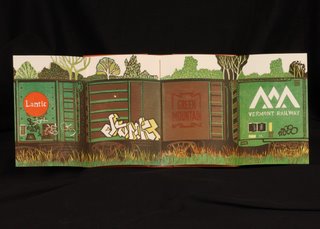
The Brattleboro Literary Festival began Friday evening, and continues through Sunday October 8. From the strange coincidence mentioned at the opening of Friday's kickoff reading, a haunting and powerful spirit of conversation across cultures and languages fluorished.
Here's the coincidence: Both Ilya Kaminsky and Martín Espada, the poets reading that night, became Legal Aid lawyers and worked for the rights and lives of those whose voices are rarely heard, and rarely strong enough.
Like many a coincidence, when you delve into this one further, it starts to make astounding sense. The two poets speak, in their writing, not just for themselves but also for those wounded and threatened. Kaminsky's award-winning book DANCING IN ODESSA begins with "Author's Prayer," opening:
If I speak for the dead, I must leave
this animal of my body,
I must write the same poem over and over,
for an empty page is the white flag of their surrender.
And Espada, in his newly released THE REPUBLIC OF POETRY, speaks for Chile and its people; for the beloved poet Pablo Neruda; and for the lost, the disappeared, the dead. From "The Soldiers in the Garden," set outside the home of the dying Neruda:
For thirty years
we have been searching
for another incantation
to make the soldiers
vanish from the garden.
Framing his reading Friday with poems from his earlier book ALABANZA, Espada also gave voice to veterans of the Vietnam war, in the context of the enduring wars in the Middle East.
Translation weaves its complex patterns through both poets' lives, also: Espada, a New York Puerto Rican, learned his Spanish as a second language and now it's part of his heart, just as his heart,
corazon, is part of a throbbing, drumming voice of poetry that echoes the rhythms of Latin America.
And Kaminsky, who came from the Ukraine to the United States as a small boy and who "had to learn English or die," proclaims his poetry with both the heavy accent of his birth language and the rising call of one who has long ago ceased being able to hear "normally."
So one of today's extraordinary moments was Espada reading multilingually with Iranian poetry translator Niloufar Talebi. Talebi, lead poet in the afternoon's "Hearts of Spain" exploration of poetry and the Spanish Civil War, is engineering a global translation effort for the poems of Iran -- which has its "disappeared" just as Chile and Nicaragua and many Caribbean islands have experienced. Her presentation of Neruda quickly grew to include Espada and his booming voice, driving the Spanish words into the air like hammered beams, strong, true, visible. When Espada later commanded the podium on his own, working with the words of Vallejo, Hernandes, and more (including some of his own translation work), the packed room shook with his vehemence.
And one of last night's unforgettable visions was the four-way poetic performance of (1) Ilya Kaminsky, (2) audience members holding and sharing with each other copies of DANCING WITH ODESSA that Ilya provided to help them understand his voice, (3) a Sign translator for the deaf moving Kaminsky's poetry from the page to her hands and face seconds before Kaminsky spoke the words, and (4) a second translator for the deaf, picking up the text from her collaborator and echoing it, with dramatic gestures and expressions, for those able to lift their eyes from the printed pages.
Let not the distance in time and place, from the Spanish Civil War to today's Vermont festival, be considered so very wide as to defy translation. With Brian Turner, soldier/poet and author of the acclaimed HERE, BULLET also giving voice to the poetry of 1938 and 1939 Spain came the reminder that this war and the war in Iraq, where Turner served, share events, mishaps, shapes on the tongue and in the mind's eye, courage and love, and the same abiding and terrible losses. Turner's poem "Body Bags" begins with an image from any war, from all:
A murder of crows looks on in silence
from the eucalyptus trees above
as we stand over the bodies --
And Turner frames his sections of poems with much older work from the Qur'an and other translations from the Arabic: such as, "Do they not see the birds above their heads, / spreading their wings and closing them?"
To share all this -- ah, poetry. Ah, the festival. Ah, the poets. Or as Kaminsky wrote of World War II (multilingual) poet Paul Celan:
He writes toward your mouth
with his fingers.
[N.B. Espada reads at the St. Johnsbury Athenaeum on Sunday October 8 at 3 p.m. -- free and open to the public, and fully accessible. I would drive at least 200 miles again to hear him read.]




